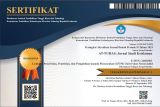Integrasi Ilmu Keislaman dan Sosial Humaniora dalam Studi Islam: Kritik Epistemologi Muhammad Arkoun terhadap Metodologi Studi Islam
(1) * Arisy Abror Dzukroni
 (UIN Sunan Kalijaga, Yogyakarta)
(UIN Sunan Kalijaga, Yogyakarta) Indonesia
(*) Corresponding Author
AbstractArkoun sees a stagnation in religious studies experienced by many researchers, either by Muslims (insiders) or by non Muslims such as orientalists or occidentalists (outsiders). This is due to Arkoun's study of Islam which is logocentric, which is only centered on one opinion. This phenomenon continues to the point that people see Islam as Islamism, not Islamology. This paper wants to reveal how the responses and solutions offered by Arkoun in addressing this phenomenon. This research uses qualitative methodology and literature study. Arkoun offers the concept of deconstruction, which eliminates the construction of old knowledge buildings and offers new ones. To achieve this, Arkoun proposed the methodology of appliance islamology as a new way of reading Islam. One of them is with intertextuality, a reading Islamic religious sources with various scientific approaches, including social sciences and humanities. Although he received some criticism from various parties, however with his new reading, Arkoun found a new concept in Islamic studies that was more in line with the times.. |
Keywords
Full Text: PDF
Refbacks
- There are currently no refbacks.
Copyright (c) 2022 Arisy Abror Dzukroni
This journal is licensed under a
Creative Commons Attribution-ShareAlike 4.0 International License





.png)






